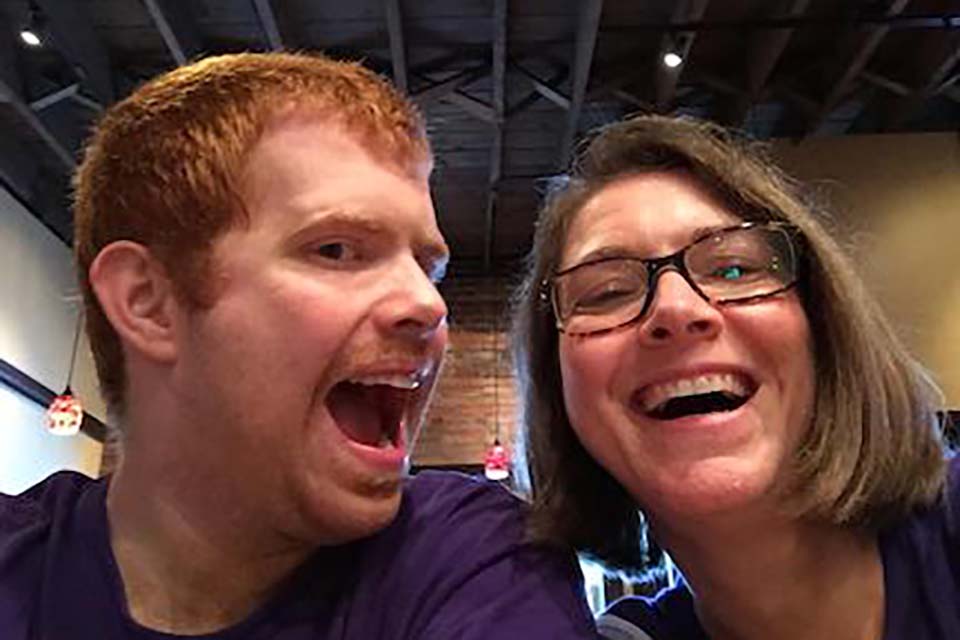MS in Medical Cannabis Class of 2021 Alumnus Advocates for Expanded Research and Access
Posted with permission from Americans for Safe Access Activist Newsletter, October 2021
Why would a senior health care executive, business consultant, and community leader seek a graduate pharmacy degree focused on cannabis? The love of a son with severe autism was the answer for Michelle Wright. In May, Michelle graduated from the first Master of Science program in the country in Medical Cannabis Science and Therapeutics from the University of Maryland Pharmacy School. When the program launched in 2019, she decided to apply so she could learn more about the medicine that she believed had saved her son’s life.
Michelle describes her 29-year-old son Ian as a grown man who still watches Barney, plays with stuffed animals, and needs help with everything from getting dressed to using the bathroom. His speech is also limited to that of a 2 to 3-year-old, which can increase his frustration when trying to communicate.
Michelle and her husband, Greg, knew that Ian would need lifelong care. Greg quit his job 25 years ago to be a full-time dad to Ian and their younger son Connor, while Michelle worked. But they were not prepared for the turn things took when Ian was no longer school age. Adult services for the severely autistic are not the same as those provided to children, and many adults with autism struggle after leaving school.
Ian’s behavior deteriorated in his early 20s. He had been on a few medications most of his life, with manageable side effects. But after leaving school at 21 he started to develop more self-injurious behaviors which resulted in more medications being added. He also experienced weight gain and tremors from his medication.
“We tried switching out his one anti-psychotic drug, but that just made things worse,” said Michelle. The doctors tried everything they could think of – neuroleptics, anti-depressants, mood stabilizers, blood pressure, anti-anxiety and anti-seizure medications (though he has never had a seizures). Then medications to manage the side effects. Ian developed facial tics and became extremely self-injurious, beating his head so severely he had to start wearing a helmet. He was also becoming more aggressive, lashing out in pain at family members. Between the ages of 25 and 27, Ian cycled through a cocktail of 13 different medications and lost 40 pounds.
“He was so thin. He became catatonic at times and wouldn’t eat or use the bathroom,” Michelle remembers. “Other times he would be violent and harm himself or punch a hole in the wall. It was so awful to watch my baby suffer. We were truly desperate. We had to try something different.”
Luckily, medical cannabis had become operationalized in Maryland in 2017. Michelle had read about medical cannabis helping patients like her son, and the side effects seemed less than the drugs he was on.
“We thought, we’ve tried so many things. Shouldn’t we try cannabis before moving to even more intensive drugs and treatment?”
Ian’s doctors were not supportive, but Ian had been seeing a nurse practitioner at the practice who was willing to continue to see him and help manage his medications as they introduced cannabis to his regimen.
Once they started, Michelle saw improvement in Ian. Within a few weeks he needed less of the anti-anxiety medications he was taking four to six times a day. He began sleeping more and gradually emerged from the relentless psychotic and catatonic episodes.
“I’d see the light in his eyes every once in a while,” says Michelle. “I’d wait for those few minutes a day of seeing my big guy again. I would say to my husband, ‘There he is!’”
Finding the right medicine and dose for Ian took lots of trial and error. He is sensitive to the cannabinoid balance and different terpenes. Fortunately, Maryland requires complete Certificates of Analysis showing both the major cannabinoids and the terpenes in whole-plant medicine, so Michelle and her husband can make their own cannabis pills with the right dosing for Ian.
After two years, Ian had weaned off all but one pharmaceutical medication that he takes at a lowered dose. He’s gained 20 pounds and most all of medication side effects have stopped. He still has some anxiety and outbursts of behavior, but he is more able to control his serious negative behaviors. He no longer wears a helmet for hours a day, and he is not aggressive to others.
“He has agency again. He wakes up happy, not screaming and banging his head,” Michelle says. “We take walks, and he holds my hand. He communicates more than he ever did before, expressing his wants and needs.”
As the holder of a graduate degree in medical cannabis science, Michelle is now better equipped to understand how medical cannabis has helped her son. But she recognizes that educating physicians can be an uphill battle.
“Doctors lack training on the endocannabinoid system, and legal barriers to research in the U.S. have created a bias that there isn’t any science there,” says Michelle. “But there is. We need much more research, but there is enough that cannabis should be an option for discussion with doctors when traditional treatments have failed.”
Michelle is grateful that her family has the ability to care for Ian and access to cannabis, knowing not everyone does. She hopes that sharing her family’s experience can help encourage more research and better access for patients like Ian who desperately need their medicine.
“It was never about curing Ian of his autism. That is who he is,” says Michelle. “But cannabis has helped him be more of his best self. That is what we want for him. That is what we hope for others.”

